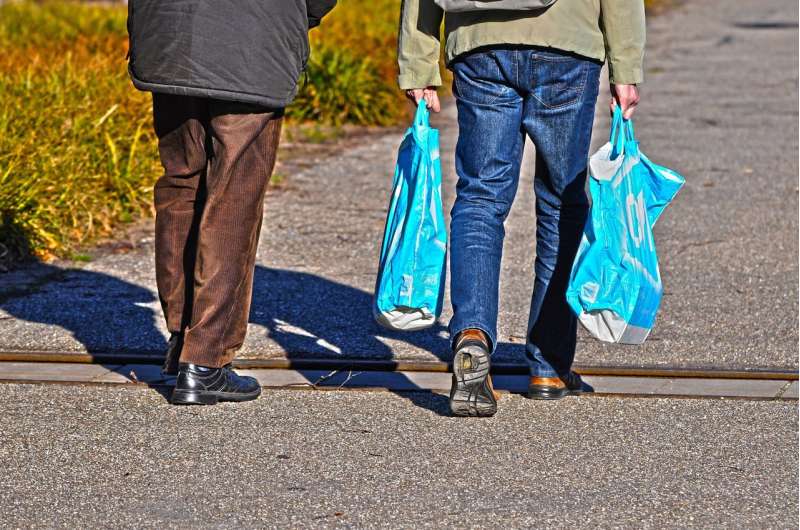This article has been reviewed according to Science X's editorial process and policies. Editors have highlighted the following attributes while ensuring the content's credibility:
fact-checked
reputable news agency
proofread
Paper or no plastic: New bill may eliminate plastic bags in California entirely

For anyone who's shopped at Trader Joe's, it's already a familiar choice: You can carry your groceries out in a paper bag or perhaps a spare cardboard box, in a tote you brought from home or—if you're shopping lightly/daringly—by hand.
What you can't use is a plastic bag issued by Trader Joe's. The store doesn't give them out.
A bill two local lawmakers introduced Feb. 8, in Sacramento would apply the Trader Joe's policy statewide, banning stores from offering customers any sort of plastic film bags at checkout.
If you're thinking "didn't we already do that?" the answer is yes and no.
A decade ago, California legislators approved the nation's first ban on the flimsy single-use plastic bags then commonly offered at most stores. Plastic bag manufacturers fought back, with the question put to voters in 2016. More than 53% of Californians voted to uphold the ban, which kicked in the next day.
But that law included a carveout that lets stores sell thicker plastic bags, typically at 10 cents each, since those are deemed "reusable." And Jenn Engstrom, state director for the public interest advocacy group CALPIRG, said plastic bag companies have taken advantage of that loophole by mass producing thicker plastic bags that are sometimes now the only option for shoppers who don't bring their own reusable tote.
The problem, data shows, is that most people still aren't taking those bags back to grocery stores. The thicker bags also are just about impossible to recycle, since they need to go to special facilities. So while Californians are using fewer plastic bags, and those bags aren't showing up as often during coastal cleanup days, data shows residents are actually producing more plastic bag by weight per person now than they did before the ban took effect.
The weight of plastic shopping bags thrown away by Californians in 2004, for example, was 147,038 tons, or roughly 8 pounds per person, according to CalRecycle. In 2021, plastic bag waste weighed 231,072 tons, or roughly 11 pounds per person.
Such spikes aren't happening in places that don't have loopholes allowing for thicker bags.
A dozen states and more than 500 cities have some sort of plastic bag ban in effect, per data in a report last month by CALPIRG and the Environment California Research and Policy Center.
The advocacy groups studied how full bans on all plastic film shopping bags have played out in five places: New Jersey; Vermont; Philadelphia; Portland, Ore.; and Santa Barbara. (Such local bans on plastic grocery bags were superseded by California's less stringent policy in 2016, though cities and counties can still ban plastic bags in retail shops and restaurants.) Researchers found strong bans eliminate an average of roughly 300 single-use plastic bags per person per year.
"Plastic bag bans work—just not the way California does it," Engstrom said.
To help California catch up, state Sens. Catherine Blakespear, D-Encinitas and Ben Allen, D-Santa Monica, and Assemblymember Rebecca Bauer-Kahan, D-Orinda, introduced identical bills in the state Senate and Assembly that would make it illegal for stores to offer plastic film bags to customers starting in 2026. Instead, proposed Senate Bill 1053 and Assembly Bill 2236 would allow stores to provide 100% recycled paper bags or let consumers use their own reusable bags.
"If you have been paying attention—if you read the news at all in recent years—you know we are choking our planet with plastic waste," Blakespear said.
"A plastic bag has an average lifespan of 12 minutes and then it is discarded, often clogging sewage drains, contaminating our drinking water and degenerating into toxic microplastics that fester in our oceans and landfills for up to 1,000 years. It's time to improve on California's original plastic bags ban and do it right this time by completely eliminating plastic bags from being used at grocery stores."
The California Grocers Association is backing the bill, as it did with the original ban in 2014.
In a press conference Thursday morning—flanked by plastic bag ban supporters wearing sea turtle and "plastic monster" costumes and carrying signs with messages like "leave plastic to Barbie"—Daniel Conway, a spokesman for the trade group, said California's first ban was "revolutionary" when it passed.
"Like most good laws, you have to take a look and you have to adapt to changes in the world we live in," he said.
Asked whether the lawmakers are concerned about this bill facing the same sort of pushback from plastic bag companies as the previous ban did a decade ago, Blakespear noted there has since been consolidation within the industry, with many of the same companies now producing paper and plastic bags. So she hopes they'll simply get on board with shifting to providing more paper bags.
The lawmakers said they also hope that California strengthening its ban will spur others to follow suit, as happened when the state passed regulations around vehicle emissions.
"As the fifth or fourth largest economy in the world, depending on how you count it, we know that what we do here really does end up having ripple effects globally," said Allen, who chairs the Senate Environmental Quality Committee.
"We're not just on our own when we make these decisions. We're making decisions that end up impacting markets and have global implications."
2024 MediaNews Group, Inc. Distributed by Tribune Content Agency, LLC.



















